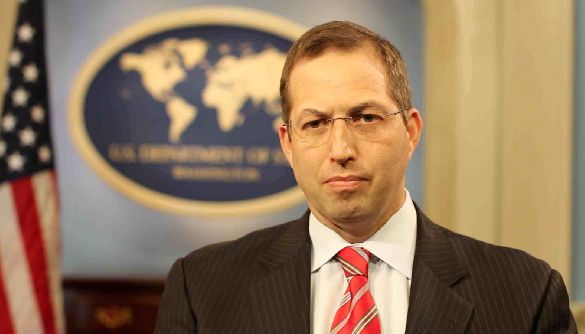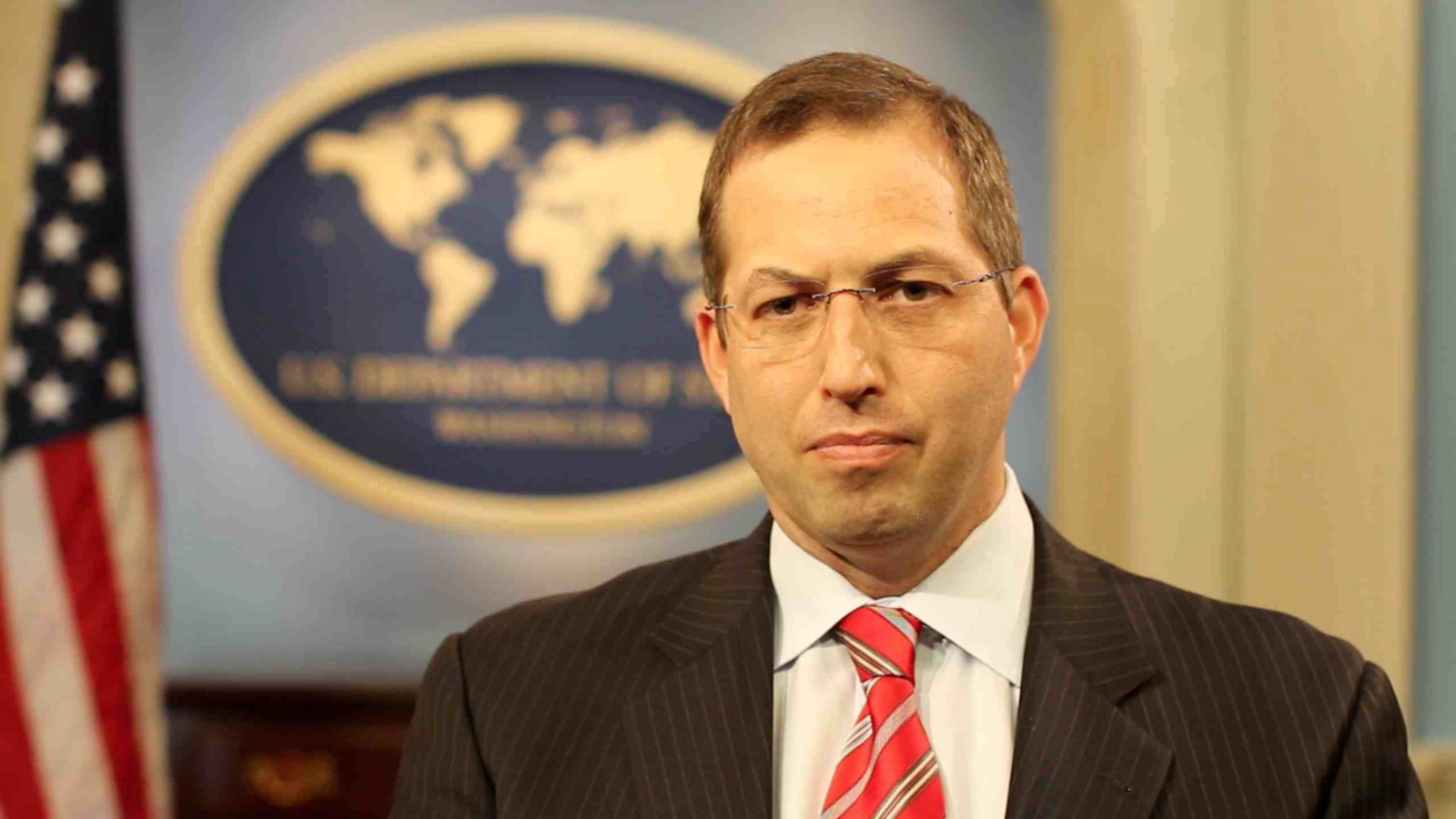
Derek Mitchell, NDI: What happens in Ukraine doesn't stay here
Derek Mitchell, NDI: What happens in Ukraine doesn't stay here


Read in Russian – here.
On November 17, joint delegation of the National Democratic Institute (NDI) and the European Parliament has presented in Kyiv an official statement on upcoming elections of the President of Ukraine. The statement was prepared after one week visit of the delegation and its meetings with political parties, prospective candidates, national and international groups of election observers, representatives of media outlets and civil society, officials, members of the Central Election Commission, MPs, and diplomats.
According to the statement, Ukraine achieved significant progress during last years despite Russia’s aggression. Among other things, NDI and the European Parliament recommended Verkhovna Rada to fund UA:PBC properly. They also stated that Facebook should open an office in Ukraine and cooperate with all Ukrainian stakeholders in order to monitor, reveal and counter disinformation. Political advertising both in mainstream media and on social networks should be marked clearly.
The Detector Media met with the head of the delegation, President of NDI Dereck Mitchell and asked him about the details. Mr. Mitchell headed NDI in September. From 2012 to 2016, he served as U.S. Ambassador to Myanmar (Burma). Prior to that, Dereck Mitchell was a Principal Deputy Assistant Secretary of Defense, and from 2001 to 2009, a senior fellow for Asia at the Center for Strategic and International Studies (CSIS). From 1997 to 2001, Mitchell was Special Assistant for Asian and Pacific Affairs in the Office of the Secretary of Defense. He began his service in Washington from 1986 to 1988 as a foreign policy assistant in the Office of Senator Edward Kennedy.
– Mr. Mitchell, thank you for your statement and presentation. Both were very interesting. But I am also interested in your impressions because you met our politicians, representatives of media sector, civil society, etc. In your opinion, what are the main threats and challenges for Ukraine during upcoming elections?
– First of all, here's a very vibrant political culture which is encouraging commitment to the democratic process. I think it's a strength for the country. The spirit of Revolution of Dignity and Maydan is still there, but there is in more and more concern. The Russian influence looks like a major challenge, as something to mitigate.
It was also concerned about – depending on whom we talked to, of course – the increase in violence in civil society. That's not necessarily directed at the election, but it created an atmosphere of fear, intimidation, and impunity that raised concerns about whether it's going to be electoral atmosphere.
Certainly, that many folks raised the corruption issue. It's so deeply ingrained in the system that there is not enough trust and confidence in the anti-corruption agencies that exist. So, that need to be strengthened, and people want to see more there.
There are lots of challenges, and we make 51 recommendations. Some of them are easier to do than others; some are just processes encouraging and implementing certain things, but others are little more fundamental. And I think that the biggest challenge is trust in the process that everybody will have ability to get their message out: a lot of talks were about media, TV taken on by oligarchs. It needs to be more and more equitable playing field so that the message can come out, people can make their judgments, and that there's no sort of corruption of the process.
– Different opinion polls during this year, including ours, show that Ukrainian people think that internal threats (e. g. corruption or economic crisis) are more dangerous than Russian aggression. Do you agree with this perception of Ukrainians? What is more dangerous?
– They're both quite dangerous. They're linked, of course. I mean the fact of Russian aggression cause or exacerbate the recession; it creates tremendous economic hardship, social divisions, and problems within the society. We know that we didn't see it ourselves because we stayed in Kyiv, but we certainly heard about it: you just go few miles outside of the city, and people are living in quite disparate hardship. And that needs to be addressed. We need to find a way to assist you and your economic development to create that kind of stability. But the Russian activity goes to be heard over and over. It's an existential threat for sovereignty and territorial integrity of the country. And that's really essential for healthy democracy: as we talked about, it can infect social trust. So, all of them play off each other. I don't know how to list which one is one, which is two, but they're so interlinked.
– Can you predict in what way, by which tools Russia will interfere in Ukrainian elections?
– I think they'll try to hide. Maybe, they'll do it to people within the society who are sympathetic to Russia for various reasons. They may try to play off those who're supporters within the system. Or they may find ways to subvert the mainstream media efforts with the misinformation or digital technologies to cause confusion. And the confusion helps to concern power of one or another candidate directly or simply undermine people's confidence in the process. For instance, they just write that the counting of the votes is not confident – the buzzword done and that can create problems.
There are many very creative ways to undermine democratic countries around the world. Ukraine is on the front lines of this. What happens here doesn't stay here. We saw that in the U.S. election, we see that around the world. We need to provide support the best we can because what happens here is a harbinger of what could happen elsewhere.
– Let's talk about your particular recommendations. For example, you recommend funding public broadcaster properly. Thank you for that. As I'm working in Ukraine, I can predict the probability of accepting this recommendation by our parliament: it's rather law. But I know nothing about the U.S. playing field. You recommend Facebook to establish office in Ukraine. Will they follow your recommendation and do it before the elections?
– I see no reason why they couldn't do that quickly. I think it is absolutely a possibility. Frankly, I don't understand why it's taking this long. They have responsibilities. That's why we put it in here. Facebook is getting a lot of criticism in the West; remember an article in The New York Times. They really need to step up, and I hope that our putting it here, our talking about it will give it greater attention not to embarrass them but simply to get them to assist development of democracy and not to be a platform for the subversion of democracy. So I'm hopeful and confident that we can make this happen.
– Did you meet our businessmen or representatives of business society during your visit to Ukraine?
– We did not. We had schedule that ran from breakfast until 9:00 at night every day, there was not a moment to see business. But I feel like we got pretty good cross-section perspectives. That's a good point. You should also know that this is a continuum. We happen to have a delegation here for this week, put out a statement, with four months ahead of the election, and we have a permanent presence on the ground. So we'll have people that are in continual contact, engaging, reporting out, and helping to facilitate conversations. And then we're likely to have another delegation here for the election itself, during the week of the election. And if there's a second round of the election, we'll have a short-term delegation as well. So we will have conversations with full range of stakeholders to facilitate sound election.
– I'm asking about businessmen because we see brand new and very interesting initiative: the Atlantic Council launched the Ukrainian Election Task Force in partnership with the Victor Pinchuk Foundation. Victor Pinchuk is an oligarch, one of the richest people in Ukraine. In your opinion, is that a good idea to cooperate with big businessmen when we are talking about elections?
– I think they are stakeholders, clearly. There are a lot of suspicions about oligarchs, their influence, and how they can influence media. They control certain media outlets on TV, every time we mention it when we talk to a political party or a prospective candidate. So they are a factor. And instead of being a factor of concern they have to be a factor for the solution, to be part of the solution. Engaging them in the process make sense. Maybe, they can affirm some of the things we said, including the importance of being transparent, demonstrating that they are underwriting democracy, when they are not simply giving weight to one particular candidate but have a mandate for fairness and equity for all candidates providing them with a platform for open debates.
– NDI is on the so-called “patriotic stop list” in Russia. Can you conduct any activities in Russia so far?
– We do not have an office in Russia now. But we continue to have contacts and engagement with Russians who are interested in democracy. I strongly believe that there are people in Russia who would like to continue engagement with the outside world, understanding democratic practices, developing institutions. So yes, we can continue to be engaged without being present inside the country.
– You were recently appointed as the President of NDI; you began your new duties in September. What will you focus on?
– My background is working on Asia. I was Ambassador in Myanmar (Burma). Now we have offices in 58 countries. We work in 70+ countries and we have worked in more than 100. I'm looking at priority places to start. This is my first major trip. I've made trips elsewhere, but this is the first time I've spent a week somewhere, and certainly, it's the first delegation trip.
That’s very conscious. I want to get to Ukraine earlier. What happens here is very important for democratic development in the region; it's important addressing the threat of Russia not only in this region but elsewhere. It's very happy to get in one week very strong understanding of the situation. I will continue to keep an eye on it. And I hope to be back for the election itself. But there are other places around the world that are also quite important. We're undergoing some questions about their democratic future. I’m also focused on the digital component. Facebook here is part of a broader theme. I want to focus on the impact of digital technologies on democracy and on the access for people to good information and, therefore, good debates. I've already been to Silicon Valley and talked to many of companies there.
I'm focused on inclusion women and marginalized communities, LGBTI. Every human being has dignity, deserves to have a voice, and should be treated equal everywhere without exception. It's also important for women to have equitable ability to compete, and have no violence or any other extraordinary challenges to their political participation.
Finally, the challenge of great powers of those like Russia and China is also a focus of mine. They want to subvert others and promote a different idea of democracy. We need to be alert to how they’re operationalizing that around the world for their own interest and against the interest of individual countries, like Ukraine.
Photo: Ann Corcoran / Refugee Resettlement Watch












